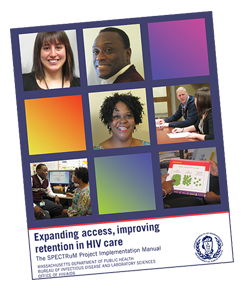Wednesday, July 27, 2016
 Although current medical treatments have improved health outcomes for many people living with HIV, engagement and retention in health care and adherence to antiretroviral treatment continues to be a challenge. In 2011, the Massachusetts Department of Public Health (MDHP), Bureau of Infectious Disease and Laboratory Sciences, undertook the Strategic Peer-Enhanced Care and Retention Model or SPECTRuM project. From its inception, CAHPP staff and consultants worked with the MDPH and its partner sites to develop and evaluate two interventions that work together to enhance prompt linkage to care, intensively support retention in care, and improve adherence to prescribed treatments. CAHPP documented these efforts and worked with the MDPH team and clinic staff to create an implementation manual that describes the service approaches and lessons learned from the initiative, including many of the assessment tools and direct care resources used.
Although current medical treatments have improved health outcomes for many people living with HIV, engagement and retention in health care and adherence to antiretroviral treatment continues to be a challenge. In 2011, the Massachusetts Department of Public Health (MDHP), Bureau of Infectious Disease and Laboratory Sciences, undertook the Strategic Peer-Enhanced Care and Retention Model or SPECTRuM project. From its inception, CAHPP staff and consultants worked with the MDPH and its partner sites to develop and evaluate two interventions that work together to enhance prompt linkage to care, intensively support retention in care, and improve adherence to prescribed treatments. CAHPP documented these efforts and worked with the MDPH team and clinic staff to create an implementation manual that describes the service approaches and lessons learned from the initiative, including many of the assessment tools and direct care resources used.
“This was a true partnership from the first grantee meeting,” recalls Sophie Lewis, Service Planning Manager, Office of Health Care Planning, Bureau of Infectious Disease and Laboratory Sciences, Massachusetts Department of Public Health. “The BU staff’s breadth of experience around the peer component and knowledge of evaluation helped inform the development of both the peer-nurse component and the data evaluation. The impact of this project has been significant. We are looking at different mechanisms to improve linkage to care, using surveillance data much more effectively and efficiently, and developing closer partnerships with health centers and community-based organizations, all as a result of SPECTRuM.”
“This was a true partnership from the first grantee meeting. We are looking at different mechanisms to improve linkage to care, using surveillance data much more effectively and efficiently, and developing closer partnerships with health centers and community-based organizations, all as a result of SPECTRuM.”
MDPH staff will bring copies of the intervention manual to the Ryan White conference next month, where they will present their work on SPECTRuM to other HIV health care and service delivery providers in a workshop.